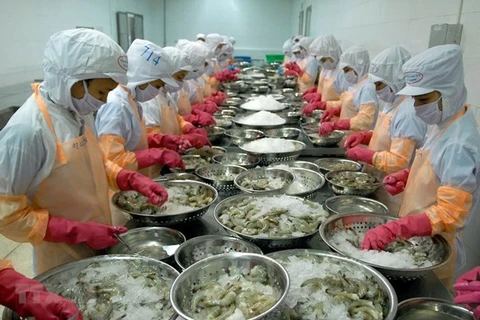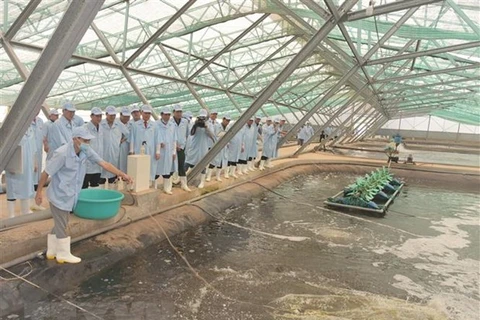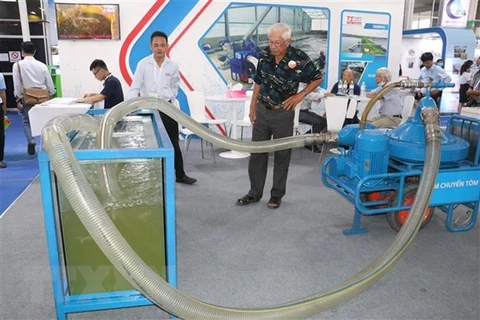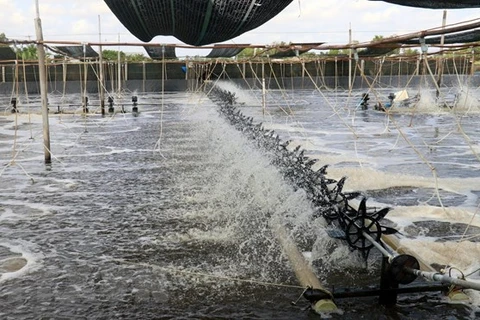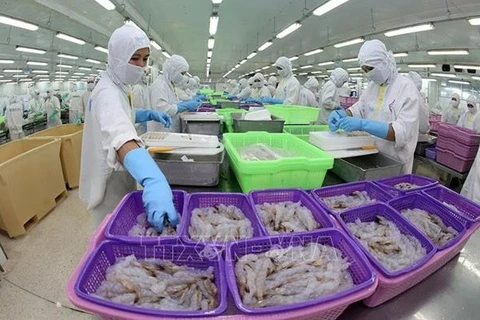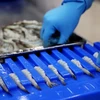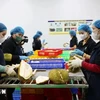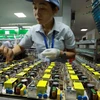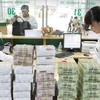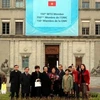 There remains large room for Vietnam’s shrimp industry to strive for greater export growth. - Illustrative image (Photo: VNA)
There remains large room for Vietnam’s shrimp industry to strive for greater export growth. - Illustrative image (Photo: VNA) HCM City (VNA) – There remains large room for Vietnam’s shrimp industry to strive for greater export growth in the next few years, said the Vietnam Association of Seafood Exporters and Producers (VASEP).
According to a recent report of the VASEP, Vietnam’s shrimp export turnover is likely to expand annually by 9 percent in the 2022-2025 period, hitting 5.6 billion USD by 2025.
Regarding seafood export opportunities in 2022, VASEP General Secretary Truong Dinh Hoe said seafood exports in 2022 will continue to grow as the global demand for shrimp is rising by around 5 percent a year.
If the seafood industry can expand its market share in the global market, and at the same time continues to promote processing of value-added products, it will be able to maintain growth in the coming time, he said, adding that the shrimp industry continues to be expected to be a key contributor to the country’s seafood export turnover.
From a market perspective, Ho Quoc Luc, Chairman of the Board of Directors of the Sao Ta Food Joint Stock Company said Vietnamese processed or fresh shrimp products are popular due to their more beautiful packaging and stable quality compared to other competitors.
 Vietnam has quickly seized this opportunity to increase its seafood market share in major markets. - Illustrative image (Photo: VNA)
Vietnam has quickly seized this opportunity to increase its seafood market share in major markets. - Illustrative image (Photo: VNA) The US remains the largest importer of Vietnam’s shrimp products at present, accounting for 28 percent of Vietnam's total exports, followed by Europe and Japan, which made up 21.8 percent and 14.9 percent of the market share, respectively.
The US would continue to be the key market for many Vietnamese seafood products such as shrimp, pangasius and others, he said.
Vietnamese exporters would have more opportunities to export to the US since India, the largest shrimp supplier to the market, was facing production difficulties due to the pandemic, he added.
Vietnam ranks fifth among shrimp exporters to the US.
Although not accounting for large proportions in Vietnam’s shrimp export, the Republic of Korea (RoK), Canada, and Australia have still maintained fairly stable growth.
Notably, Vietnamese shrimp have gained the top positions in the RoK and and Australia, Luc said.
Sharing the same view, Tran Van Linh, Chairman of the Board of Directors of Thuan Phuoc Seafood and Trading Corporation, said that the COVID-19 outbreak in the past two years has disrupted the global supply chain, and competitors of Vietnam's seafood were "stuck" and have not yet recovered yet.
Vietnam has quickly seized this opportunity to increase its seafood market share in major markets such as the US and Europe, he noted.
According to experts, Vietnam's shrimp farming process has been improved remarkably, while supply chains have been also expanded continuously, contributing to increasing productivity.
They underlined the need to better production lines, reduce dependence on labourer, and ensure regulations on food hygiene and safety.
Luc said attention should be also paid to projects to call for investment in shrimp farming, stressing that that only large-scale farming facilities can bring practical efficiency through investment and application of new scientific-technological achievements in shrimp farming.
Localities with favourable conditions and strengths to develop shrimp farming should quickly build planning of farming areas in the direction of green and sustainable development, experts said, adding that this is a big solution to the shrimp industry’s development strategy by 2030./.
